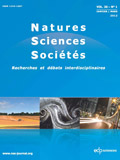Résumé
Cet article éclaire le champ de recherche de la méthanisation agricole en interrogeant la tension qui ressort entre le répertoire de la transition énergétique et celui de la transition écologique lorsqu’on examine la territorialisation des acteurs et des processus, et non simplement la production d’énergie renouvelable. L’analyse repose sur une approche bibliométrique à partir des travaux publiés en français et en anglais – en mobilisant le logiciel libre IRaMuTeQ –, couplée à la lecture qualitative de ces articles. Loin de tout regard unique, la problématique sociétale de la méthanisation agricole s’analyse à la jonction des deux registres du projet – la territorialisation de l’enjeu se marque à la fois spatialement et par rapport à une pluralité d’acteurs en interaction – et de la production énergétique (qui s’appréhende en lien à une conformation d’opportunités et de contraintes sociales, économiques et réglementaires). Il apparaît que la méthanisation agricole est sous-étudiée en durabilité et nécessite une analyse relationnelle afin de rendre raison de la diversité des positionnements et des débats, à la fois en tant que filière d’énergie renouvelable et quant à ses impacts socioécologiques.
Mots clés : agriculture / technologies / développement durable / interdisciplinarité / lexicométrie
Abstract
This paper sheds light on agricultural anaerobic digestion, examining the tension between the challenges of energy transition and those of ecological transition when we consider the territorialisation of actors and processes, and not only the production of renewable energy. Based on the existing studies devoted to the subject, the analysis aims to present an outline of the field. The authors adopt a bibliometric approach based on works in both French and English. They use the free software IRaMuTeQ, which counts occurrences of words and takes lexical proximity into account and provides graphical representations. This lexical analysis is combined with a qualitative reading of the articles. It appears that the societal issues linked to agricultural anaerobic digestion cannot be grasped from one single perspective but should be analysed both in terms of project —its territorialised dimension is reflected spatially and through the interactions between the multiple actors involved— and of energy production —reconfigured in relation to a set of social, economic and regulatory opportunities and obligations. These dynamics are reflected socially in stakeholders’ interactions and differing perceptions, and materially rooted in a whole ecosystem, having a strong influence on the technologies used (the management of effluents, etc.) as well as on the social groups involved (when faced with calls to change their agricultural and cultivation practices for example). This raises the issue of repositioning the energy repertoire that primarily characterizes the studies about anaerobic digestion projects within a broader ecological transition frame: biogas production appears to be under-studied in terms of sustainability and, even more than other renewable energies, requires a relational analysis to account for the diversity of positions and debates at stake.
Key words: agriculture / technologies / sustainable development / interdisciplinarity / lexicometry



